With autumn comes flu season. Schools coop up children to the comfort and ease of the various germs and viruses they harbour, universities force students to get up early in the morning and breathe on each other in seminars, and the country's work-force succumbs to a violent desire to stay in bed and spend entire days watching
The Simpsons.
Hand hygiene is
so important. The most effective way to protect yourself from disease is to wash your hands. Frequently and thoroughly. (You can read about all the reasons why you should wash your hands often
here, and how to do it properly
here. Or, if the audiovisual is more your thing,
here.) We find it helpful and motivational to have lovely soap, and thought we'd share some of our favourites!
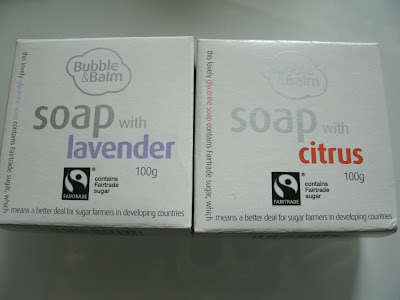 |
| The scent from these soaps is truly divine! |
We've been to
Oxfam again recently, and picked up this lovely lovely stuff from
Bubble & Balm. These soaps tick all the boxes: they are made with fairtrade ingredients, using
sustainable palm oil (
palm oil plantations do terrible damage to the environment and make orangutans homeless), and come in a box made of recycled card, with no unnecessary plastic wrapping. And they smell delicious! Monkey couldn't wait to get a good lathering with this monkey-friendly soap!
 |
| Monkey loves lovely soaps! |
We've got some more favourites: one from
Chandrika, a company from Bangalore. This is an Ayurvedic soap, containing among other things coconut oil, sandalwood oil, and orange oil. It is lanolin-free but contains palm oil, and we doubt very much that it is sustainably sourced. However, it smells gorgeous!
 |
Contains all sorts of lovely things, according to the website:
Coconut Oil : it nourishes, moisturises and lightens your skin tan.
Wild Ginger : soothes the skin and helps prevent infections and rashes.
Lime Peel Oil : for a refreshing cooling effect and rich, penetrating lather with an astringent action.
Hydnocarpus Oil : helps prevent skin problems, rashes and outbreaks.
Orange Oil : tightens pores, helps prevent pimples and blackheads.
Sandalwood Oil : to cool, refresh and gently prefume your skin.
|
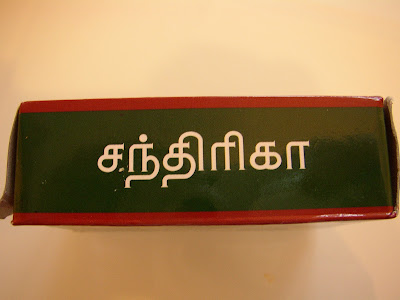 |
| We think this writing might be in Kannada, the main language in the state of Karnataka, but then again it might not. |
 |
| Just lovely |
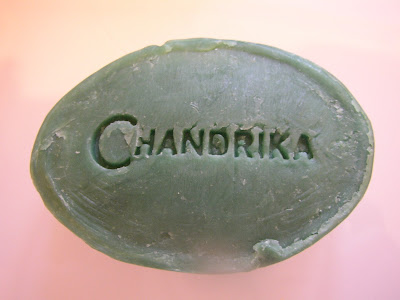 |
| We wish we could send some of the fragrance your way! |
Last, but not least, here is another soap from Bangalore - the
Mysore Sandal Soap. This one seems to be quite readily available in the UK, at least in Asian supermarkets - hurrah! It does contain lanolin, so is not free of animal products, but on the other hand it is, apparently, the only soap in the world made from 100% pure sandalwood oil. Then again, that sandalwood is reportedly
not sustainably sourced. The
commercial website claims that the Mysore Sandalwood Soap was the favourite soap of Queen Victoria, which is interesting as the company was founded in 1916.
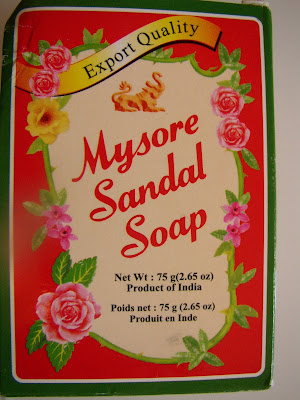 |
| A very cheerful-looking box |
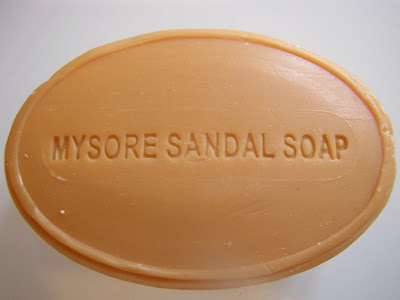 |
| We LOVE sandalwood... |
 |
| ...and surely everyone loves elephants! |
We hope this abundance of lovely, and sometimes environmentally friendly and ethically sourced, soaps inspires you to keep washing your hands, for health and well-being!
Hygeia will bless you!
Wæs hæl!
P.S. If you're Scandiwegian and enjoy reading about beauty products, check out
http://skimmerskuggan.blogspot.com/!
















